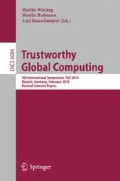Abstract
We propose a general type notation, formal semantics and a sound, compositional, and decidable type system to characterise some liveness properties of distributed systems. In the context of mobile processes, we define two concepts, activeness (ability to send/receive on a channel) and responsiveness (ability to reliably conduct a conversation on a channel), that make the above properties precise. The type system respects the semantic definitions of the concepts, in the sense that the logical statements it outputs are, according to the semantics, correct descriptions of the analysed process. Our work is novel in two aspects. First, since mobile processes can make and communicate choices, a fundamental component of data representation (where a piece of data matches one of a set of patterns) or conversations (where the protocol may permit more than one message at each point), our types and type system use branching and selection to capture activeness and responsiveness in process constructs necessary for such usage patterns. Secondly, conditional properties offer compositionality features that permit analysing components of a system individually, and indicate, when applicable, what should be provided to the given process before the properties hold.
Access this chapter
Tax calculation will be finalised at checkout
Purchases are for personal use only
Preview
Unable to display preview. Download preview PDF.
References
Acciai, L., Boreale, M.: Responsiveness in process calculi. Theoretical Computer Science 409(1), 59–93 (2008)
Acciai, L., Boreale, M.: Spatial and behavioral types in the pi-calculus. In: van Breugel, F., Chechik, M. (eds.) CONCUR 2008. LNCS, vol. 5201, pp. 372–386. Springer, Heidelberg (2008)
Caires, L.: Behavioral and spatial observations in a logic for the π-calculus. In: Walukiewicz, I. (ed.) FOSSACS 2004. LNCS, vol. 2987, pp. 72–89. Springer, Heidelberg (2004)
Deng, Y., Sangiorgi, D.: Ensuring termination by typability. Information and Computation 204(7), 1045–1082 (2006)
Gamboni, M., Ravara, A.: Activeness and responsiveness in mobile processes. In: 7th Conference on Telecommunications, pp. 429–432. Instituto de TelecomunicaÇões (2009)
Gamboni, M., Ravara, A.: Responsive choice in process calculi. Technical report, SQIG — IT and IST, UTL Portugal (2009), http://gamboni.org/i.pdf
Igarashi, A., Kobayashi, N.: A generic type system for the Pi-calculus. ACM SIGPLAN Notices 36(3), 128–141 (2001)
Kobayashi, N.: A type system for lock-free processes. Information and Computation 177(2), 122–159 (2002)
Kobayashi, N.: Typical 1.6.2 (2008)
Kobayashi, N., Sangiorgi, D.: A hybrid type system for lock-freedom of mobile processes. In: Gupta, A., Malik, S. (eds.) CAV 2008. LNCS, vol. 5123, pp. 80–93. Springer, Heidelberg (2008)
Milner, R.: The polyadic π-calculus: A tutorial. In: Logic and Algebra of Specification, Proceedings of the International NATO Summer School (Marktoberdorf, Germany, 1991). NATO ASI Series F, vol. 94, Springer, Heidelberg (1993)
Milner, R., Parrow, J., Walker, D.: A calculus of mobile processes, i and ii. Information and Computation 100(1), 1–77 (1992)
Pierce, B.C., Sangiorgi, D.: Typing and subtyping for mobile processes. In: Proceedings of LICS 1993, pp. 376–385. IEEE Computer Society, Los Alamitos (1993)
Sangiorgi, D.: The name discipline of uniform receptiveness. Theoretical Computer Science 221(1-2), 457–493 (1999)
Sangiorgi, D., Walker, D.: PI-Calculus: A Theory of Mobile Processes. Cambridge University Press, Cambridge (2001)
Author information
Authors and Affiliations
Editor information
Editors and Affiliations
Rights and permissions
Copyright information
© 2010 Springer-Verlag Berlin Heidelberg
About this paper
Cite this paper
Gamboni, M., Ravara, A. (2010). Responsive Choice in Mobile Processes. In: Wirsing, M., Hofmann, M., Rauschmayer, A. (eds) Trustworthly Global Computing. TGC 2010. Lecture Notes in Computer Science, vol 6084. Springer, Berlin, Heidelberg. https://doi.org/10.1007/978-3-642-15640-3_10
Download citation
DOI: https://doi.org/10.1007/978-3-642-15640-3_10
Publisher Name: Springer, Berlin, Heidelberg
Print ISBN: 978-3-642-15639-7
Online ISBN: 978-3-642-15640-3
eBook Packages: Computer ScienceComputer Science (R0)

